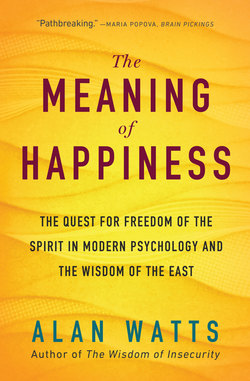The Meaning of Happiness

Реклама. ООО «ЛитРес», ИНН: 7719571260.
Оглавление
Alan Watts. The Meaning of Happiness
Отрывок из книги
Foreword to the Third Edition
Preface to the Second (1952) Edition
.....
It is important to consider this problem in relation to its historical background and to discover some of the ways in which the modern divorcement from nature developed. What is said here is true, in the main, only for Western peoples rooted in the European and Christian tradition, which is to say, for the white races. The Oriental has a different problem, at least in its preliminary stages. Of course, it is impossible to say just exactly when the modern conflict began, but an obvious and convenient starting point may be found in Catholic philosophy of the Middle Ages, although its seeds may be noticed even earlier in late Roman times. Christianity differs from many other religions in according the existence of an immortal soul only to man. The rest of creation exists principally for man’s convenience, for no other living creature is of any special significance in the divine plan. This view was never shared by the Hindus or the Chinese, and a Buddhist scripture says that in time even trees and grass shall become Buddhas. But in early Christian thought and practice there was, with few exceptions, an utter lack of concern for anything beyond the salvation of man. It was not surprising, therefore, that Christianity took on an increasingly human or anthropomorphic conception of God. His nature was made to correspond more and more with human reason while the “merely animal,” the “irrational” in nature, was more and more identified with the Devil, so that Christianity saw in the beauties of nature little more than a snare for the unwary soul, an essentially sinful world, doomed in the end to perish and give way to a supernatural Paradise.
But the thinkers of the Renaissance did not seem to share this idea, for apparently they were concerned far more with the human and natural than with the spiritual and supernatural. They were the forerunners of the natural sciences. Among them were such men as Leonardo da Vinci and Sir Francis Bacon, men who, as the latter boasted, “took all knowledge for their province.” But their preoccupation was still with man, and with the rational aspect of man as distinct from the divine on the one hand, and the bestial on the other. Certainly they found a new interest in the world of animals, trees, flowers, rocks, stars, and mountains, but only to discover therein analogies of the human being; they knew almost nothing of the Chinese and Japanese feeling for nature as nature. In their belief “the proper study of mankind was man.” And in this, for instance, we find the principal difference between Dante and Shakespeare, the former concerned with man in the supernatural world, the latter with man in his own human world, for “what a peece of worke is man, how noble in reason, how infinit in faculties, in form and moving, how expresse and admirable in action, how like an Angell in apprehension, how like a God!”
.....